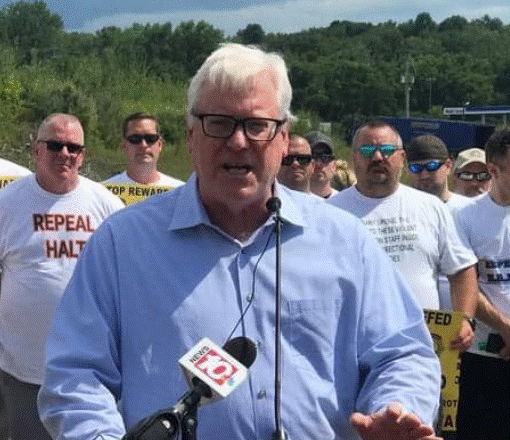“The cost of the conversion has been conservatively estimated at between $8 billion and $15.25 billion more than the cost of replacing them with new diesel buses.”
Weekly column from the NYS Senator serving the 58th district,
The more this state keeps blindly moving ahead to impose outrageous energy mandates on all New Yorkers, the clearer it becomes that the current plan is not affordable, feasible, or reliable. To say nothing of realistic.
Let’s focus on the impact on school districts and school property taxpayers coming down the line in the very near future — because that’s the latest debacle coming to light and it’s getting more expensive by the minute. In 2022, Albany Democrats enacted a new law mandating that, starting in 2027, all school buses purchased in this state will have to be electric.
We’re beginning to find out what that mandate truly means. Last week at the State Capitol, our Republican legislative conferences gathered with school district representatives to begin spelling it out for everyone (Note: You can view the entire news conference on my Senate website, www.omara.ny.senate).
First, it will be enormously expensive. Electric buses cost up to three times as much as conventional diesel buses. Additionally, schools will be required to undertake significant electrical infrastructure and distribution line upgrades, as well as address major workforce transitions. The cost of the conversion has been conservatively estimated at between $8 billion and $15.25 billion more than the cost of replacing them with new diesel buses. For already overburdened local property taxpayers, it’s emerging as yet another hard hit from yet another unfunded state mandate out of Albany.
Furthermore, it would be unworkable right now. The existing electric grid can’t support it. Electric vehicles are showing an inability to operate or charge in frigid temperatures, and it does get cold in New York. Designed to operate best in 70-degree temperatures, electric vehicles lose up to 40 percent of their traveling range in extreme cold and the time required to charge them is much longer. A pilot program in Vermont found traveling range decreased by 80 percent in some instances.
The current timeline raises far too many troubling questions on affordability, as well as on reliability and safety for student transportation. In short, it seems reasonable and fair to reassess and reexamine the current timeline and its potential impact on school districts, students and families, and local communities.
With that in mind, I have joined Assemblyman Phil Palmesano to introduce and sponsor legislation (S8220/A8447) to delay the mandate on school districts until 2045 or until all state agencies convert their own fleets of vehicles first, so that we could at least have the experience of that conversion before dumping this mandate on schools and ultimately the school property taxpayer. Additionally, the legislation would:
Ø authorize the state Commissioner of Education, in consultation with the state’s top energy regulators, to override the mandate if it is determined that zero-emission school buses are not feasible for a particular application;
Ø direct the state Commissioner of Education to complete a cost-benefit analysis for each school district that considers the costs necessary to comply with the zero-emission school bus mandate; and
Ø direct the New York State Energy and Research Development Authority (NYSERDA) to consult with the state Office of Fire Prevention and Control to develop appropriate fire suppression and safety procedures related to lithium and hydrogen-based fires.
One of the local school district superintendents who joined us last week in Albany to help sound the alarm, Dr. Thomas J. Douglas, Superintendent of Horseheads Central School District, summed it up very effectively, “The total cost will ultimately be borne by the local tax base since this is really an unfunded mandate. The sad fact is that there is no guarantee that this technology will work predictably in Northeastern winters. All the governor, NYSERDA, and PSC need do is look to the Midwest this past winter to see electric vehicles and chargers not being able to run in frigid temperatures. We cannot risk that with our children. Put simply, the state must pump the brakes on electric busing.”






